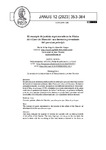El concepto de justicia representado en la plática del villano del Danubio: una herencia proveniente del speculum principis

Use this link to cite
http://hdl.handle.net/2183/36711
Except where otherwise noted, this item's license is described as Atribución-NoComercial-SinDerivar 4.0 Internacional
Collections
Metadata
Show full item recordTitle
El concepto de justicia representado en la plática del villano del Danubio: una herencia proveniente del speculum principisAlternative Title(s)
The Concept of Justice Represented in the Episode of the Villain of the Danube: an Inheritance from the Speculum PrincipisAuthor(s)
Date
2023-12-11Citation
González Luque, María de los Ángeles «El concepto de justicia representado en la plática del villano del Danubio: una herencia proveniente del speculum principis». JANUS. Estudios sobre el Siglo de Oro, n.o 12, diciembre de 2023, pp. 353-484. DOI.org (Crossref), https://doi.org/10.51472/JESO20231215.
Abstract
[Resumen] En este estudio se presenta un análisis sobre la pretensión que pudo tener fray Antonio
de Guevara al componer su famoso relato Plática del villano del Danubio. El objetivo
principal es estudiar, de un lado, la aspiración al reelaborar esta narración breve inserta
en el Relox de príncipes (1529), orientada a la correcta administración de la justica
conforme a la gestación del imperio de Carlos V en Europa y su gobierno en España,
y, de otro lado, analizar el sentido de la plática en el propio texto, que viene marcado
por el reflejo de la filosofía política especular y la originalidad literaria del autor. [Abstract] This study analyzes the purpose of Antonio de Guevara with his famous episode of the villain of the Danube. The main objective is to study, on the one hand, the author’s claim with the reworking of this brief narrative inserted in the Relox de príncipes (1529), oriented to the correct administration of justice according to the gestation of Charles V’s empire in Europe and his government in Spain, and, on the other hand, the meaning of the episode in the text itself, marked by the reflection of mirrored political philosophy and the author’s literary originality.
Keywords
Guevara
Justicia
Villano del Danubio
Speculum principis
Relox de príncipes
Justice
Villain of the Danube
Speculum principis
Justicia
Villano del Danubio
Speculum principis
Relox de príncipes
Justice
Villain of the Danube
Speculum principis
Editor version
Rights
Atribución-NoComercial-SinDerivar 4.0 Internacional
ISSN
2254-7290






